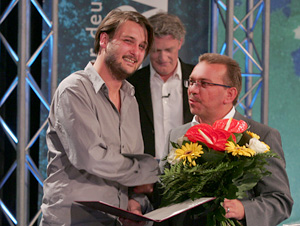
Audience chooses Rammstedt as the winner
For the seventh time the audience prize sponsored by Kelag is being awarded in this year. For the first time it is worth 6,000 Euros. The audience overwhelmingly came out in favour for Tilman Rammstedt’s text.
As always, the awarding of this prize takes place independently from the other prizes. The winner of the Bachmann prize could therefore also take home the audience prize.
Rammstedt was able to secure almost 20 per cent of the votes for himself. Martin von Arndt, who came second, received a bit over 13 per cent. In third place came Anette Selg with about 12 per cent of the votes.
Each user was only able to vote once. Only those votes were valid that included a justification for the choice of the respective author.

The director of Kelag’s executive board, Armin Wiersma, presents the 6,000-euro prize to Tilman Rammstedt.
Justifications for Rammstedt
Amongst others, the users who voted for Rammstedt gave the following justifications for their choice of author.
- Because he’s an exception, does not smell of German philology and because the author is not concerned about his own ego (something which, in my opinion, is often a problem in the Bachmann Prize.) Because he also has humour and is able to combine casualness with profoundness. Because he’s direct, has a soul and because he's alive.
- The text is very well structured, exceptionally funny, a short story par excellence, despite it only being one episode.
- Because he made no mistakes and because the audience laughed.
- Although Mohafez’ text had a greater impact on me, I am more for humour in German literature, that is, if it does not come along as brainlessly as it does on reading stages or comedies!
- A highly amusing text must definitely win the prize; we cannot always have this nagging prose, but simply an extremely well-written text.
- Tilman Rammstedt has so laconically managed to illustrate a conflict between generations with a combination of linguistic brilliance, almost macabre humour and tragic,–with the result that the grandfather described in the text will never be forgotten.
